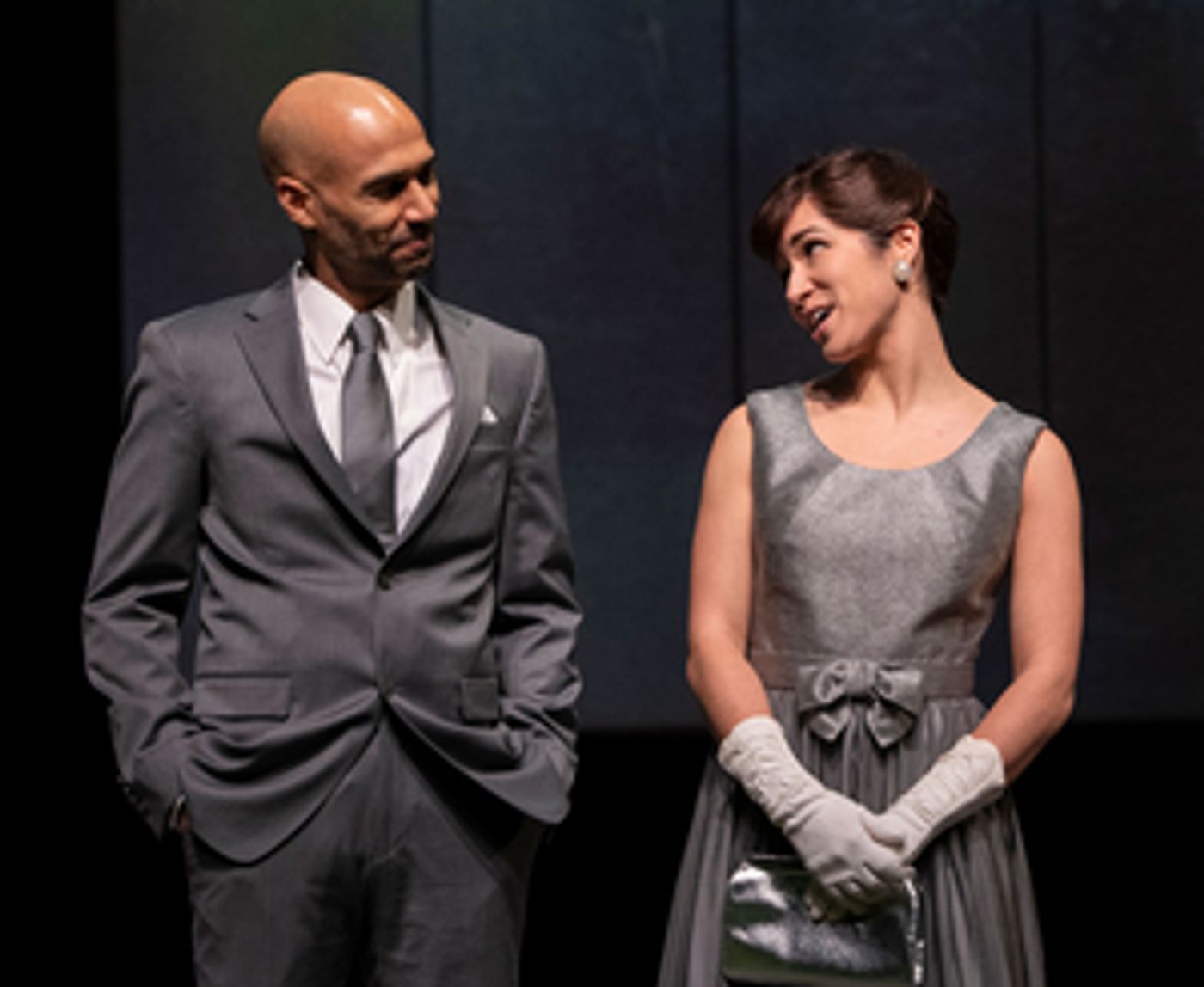Review: Arena Stage's Confused CHANGE AGENT
The play runs now through March 6th.

Upon first glance, the timing of Craig Lucas' new play Change Agent at Arena Stage is perfect. With the United States and Russia locked in another geopolitical conflict, and Congress debating voting rights legislation, a play which examines the Cold War and Civil Rights Movement and what it means to bring about change in turbulent times could not be more relevant or appropriate.
The problem is that distilling these events to a singular message and approach does not work. This is a conclusion Lucas, who also serves as director, arrives at indirectly, with Change Agent struggling to decide what exactly is the message it wants audiences to take away.
Change Agent is a play based on historical events, in this case the life of American painter Mary Pinchot Meyer (Andrea Abello) and her relationship with President John F. Kennedy (Luis Vega). The two meet at a college dance in 1936, continually run into each other at major world events, such as in San Francisco at the founding of the United Nations in 1945, and develop a friendship and then relationship culminating during Kennedy's presidency.
As Mary, a passionate Abello, serves as the play's conscience on civil rights and foreign affairs, not only with Kennedy, but others as well. This includes her spymaster husband Cord (Jeffrey Omura), best friend Cicely (Regan Linton), and Jackie Kennedy (Kathryn Tkel).
Lucas is a talented writer. His libretto for The Light in the Piazza not only conveyed great depth, but it captured the very essence of a country. One gets the sense that he's trying to do something similar with Change Agent, except this time it is to serve as the country's conscience.
Alas, the play instead comes off more like a stream of consciousness. He seems to be struggling with what he wants us to take away from characters and events as complex as the challenges we're confronting today. Further hampering his efforts is the decision to take such well known, and loved, figures and portray them in a superficial manner.
Yes, Kennedy was known to be a philanderer. There's no denying that. But he was also a man of great intellect and curiosity, something Lucas seems to diminish. The result is that a solid Vega is left to portray a man that comes off as aloof.
Tkel has the breathiness and style of Jackie Kennedy, thanks to Alejo Vietti's gorgeous period costumes, but she too is relegated to merely a caricature. Jackie captured the world's attention with her intelligence and charm. A multilingual speaker, Kennedy used her frequently to connect with non-English speaking communities both at home and abroad. So why Lucas decides to give us an image of the First Lady as a soap opera character is another confusing aspect of Change Agent.
Then there is Omura's Cord, again another real-life character with a background in intelligence that is beyond fascinating. Here again was a missed opportunity to discuss the role of intelligence and surveillance in American society. Instead, we have a character whose sole role is to look like an extra from The Man in the Gray Flannel Suit and spout conspiracy theories.
Linton's Cicely is the only one who seems to go on a true journey during the play's event. She starts as Mary's encouraging best friend, transforms into a Washington wife complete with husband in the government, a martini, and then a zinger, and then evolves into a woman seeking the truth. Out of all the character's arc, hers most resembles that of the United States during the thirties to the sixties, one of naivete, optimism, and eventually cynicism.
Caite Hevner's projections guide and orient audiences through the multitudes of decades, settings, and world events. Often when a play spans many years and features such well known settings as The White House, there is temptation for the set to be unnecessarily literal. Wilson Chin's minimalist set design keeps the action focused on the characters and events unfurling around them.
Change Agent is being presented as part of Arena's Power Play series which makes its debut all the more disappointing. Previous entries into the series, including Lawrence Wright's magnificent Camp David and Aaron Posner's thought-provoking JQA.
Like Change Agent, both plays sought to explore presidents - Jimmy Carter and John Quincy Adams - who were navigating complex issues and times. However, where Wright and Posner excelled, and Lucas failed, was in having a definitive message and showing how those around these leaders clearly affected the trajectory of history.
It is not until the very final scene where Lucas starts to connect the dots between what happened in the fifties and sixties to what is happening today in our country. By then we've been subjected to conspiracy theories about the Kennedy Assassination, two-dimensional characterizations, and a scene involving a presidential trip on LSD. At this point in the evening, it is too late to try and focus the audience.
Instead of inspiring change, Change Agent reminds us of just how crazy the Cold War was. With the United States and Russia now facing off over Ukraine, it's a shame the message couldn't have been more focused on how we can change the world for the better.
Runtime is two hours and 20 minutes with one intermission
Change Agent runs through March 6 at Arena Stage - 1101 6th St SW, Washington, DC 20024. For tickets, please click here.
Photo: Luis Vega and Andrea Abello. Credit: Margot Schulman.
Reader Reviews
Videos

